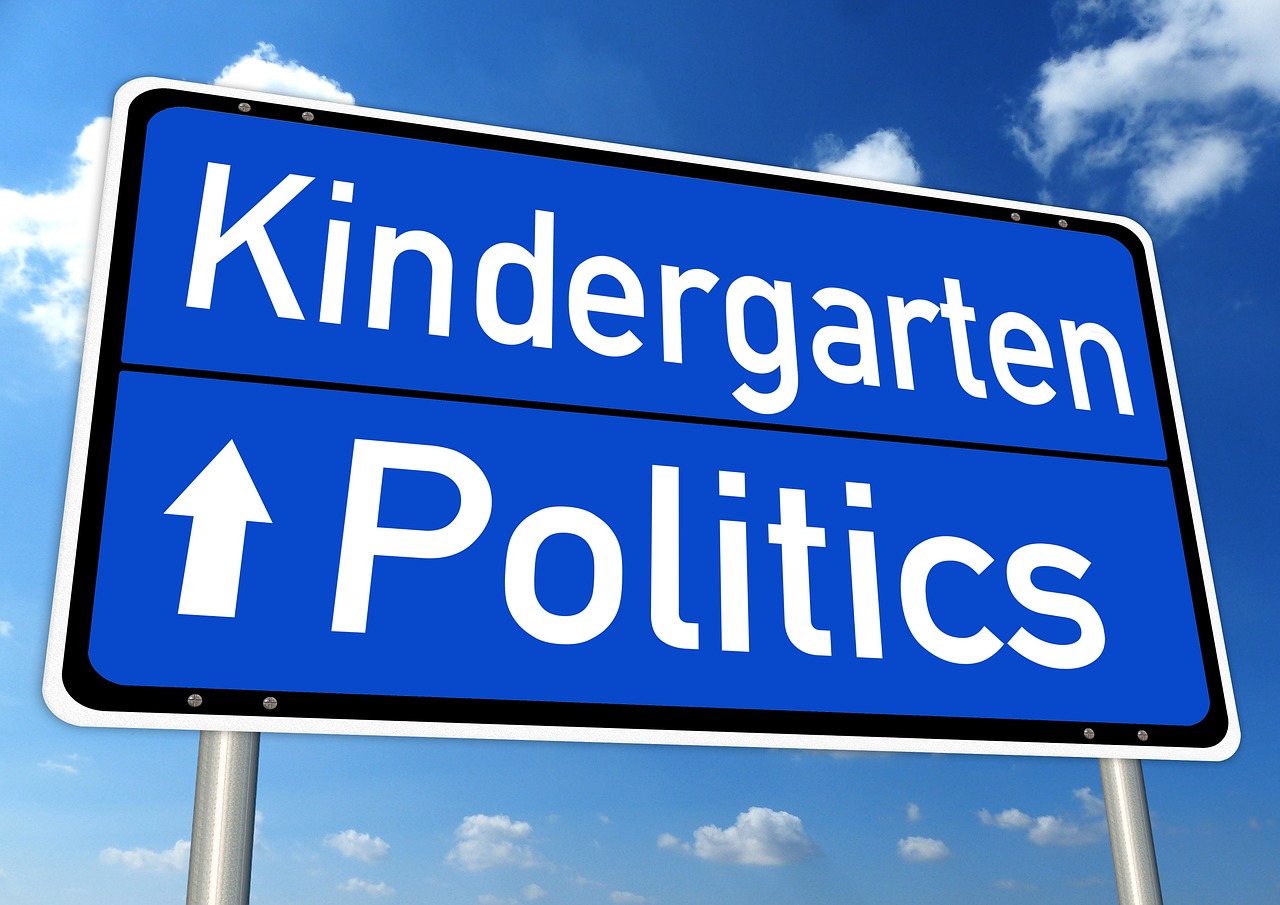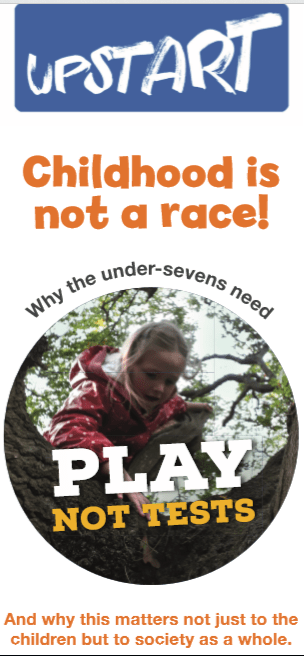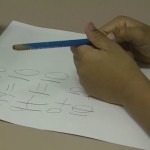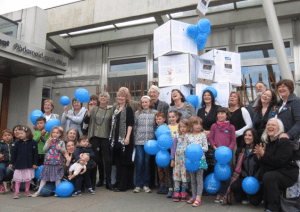
When we were planning the Upstart Scotland campaign back in 2015, we had high hopes that the Scottish government would soon take notice of our arguments and evidence. After all, countries like Finland and Canada, where they have kindergarten stages until children are six or seven, have been doing really well in terms of children’s health, well-being and education. On the other hand, countries like England and the USA – where tests and targets rule and early years education has become increasingly ‘schoolified’ – have failed to flourish educationally or in terms of health and well-being.
Add to this that the Early Level of Scotland’s Curriculum for Excellence fully supports a play-based approach in P1. Although the principles of the Early Level hadn’t been turned into practice in most Scottish schools by 2015, there were glimmers of hope that this might soon happen. We’d seen some great practice in early years settings around the country (including outdoor nurseries) and it seemed the perfect time to support a move towards this type of practice in the first couple of years of primary schooling.
 So we were utterly stunned in September that year, when Scotland’s First Minister suddenly announced the introduction of a testing regime, starting at P1. The decision had been made without consultation with educational authorities and – since the First Minister staked her reputation on the success of this educational policy – there seemed little chance of reversing it. We at Upstart understand and sympathise with the Scottish government’s deep concern about the poverty-related attainment gap but our attempts to explain to them why tests aren’t the answer have been ignored.
So we were utterly stunned in September that year, when Scotland’s First Minister suddenly announced the introduction of a testing regime, starting at P1. The decision had been made without consultation with educational authorities and – since the First Minister staked her reputation on the success of this educational policy – there seemed little chance of reversing it. We at Upstart understand and sympathise with the Scottish government’s deep concern about the poverty-related attainment gap but our attempts to explain to them why tests aren’t the answer have been ignored.
Over the last couple of years, there has, as we’d hoped, been a terrific upsurge of interest around the country in play-based pedagogy in P1 and P2 and many primary teachers are at last realising the power of the Early Level and Building the Curriculum 2 for raising attainment and improving children’s well-being. So we’ve watched with growing concern as the government continued to develop their national assessment regime for introduction this school year.
Last month, many P1s sat the tests for the first time. As is clear from this report from the Times Educational Supplement Scotland, they have not been a success. Another TES report on the same day about a similar situation in England, where ‘baseline testing’ is again to be introduced (despite two failed attempts), points out that there are serious ethical questions around testing children at such an early age.
It’s therefore deeply ironic that, four days after those newspaper reports, the Scottish government held a meeting about Adverse Childhood Experiences (ACEs). In an article in The National , John Swinney stated that the Scottish Government was determined to do everything possible to ‘prevent adverse experiences in the first place, and where they do happen, to reduce their negative impact.’ Upstart Scotland has been hugely supportive of the ACEs movement, not least because there is international evidence that a too-early start on formal learning is itself an ACE. We therefore wrote immediately to Mr Swinney offering to provide the evidence: a shortened version of our letter was published in The National.
government held a meeting about Adverse Childhood Experiences (ACEs). In an article in The National , John Swinney stated that the Scottish Government was determined to do everything possible to ‘prevent adverse experiences in the first place, and where they do happen, to reduce their negative impact.’ Upstart Scotland has been hugely supportive of the ACEs movement, not least because there is international evidence that a too-early start on formal learning is itself an ACE. We therefore wrote immediately to Mr Swinney offering to provide the evidence: a shortened version of our letter was published in The National.
On Monday 23rd April, we’ll be publishing a document outlining this evidence and many other reasons why Scotland’s under-sevens need PLAY NOT TESTS. We’re inviting Mr Swinney and other politicians along to the launch of the document in Edinburgh that evening and earnestly hope they’ll come and listen.
Once we know how many spaces we have left at the launch, we’ll advertise them on Eventbrite and hope lots of Upstart supporters can come along too. We simply can’t sit back and watch Scotland follow England and the USA along a policy route that’s damaging the well-being and educational chances of vast numbers of children.
HOW YOU CAN HELP!
Once the campaign has started, we’ll need your help to keep it going. Here’s how to get involved:
Distribute our leaflets
 We’ve had 10,000 PLAY NOT TESTS leaflets printed to help parents and other members of the public understand what the campaign is all about. Can you help us distribute these?
We’ve had 10,000 PLAY NOT TESTS leaflets printed to help parents and other members of the public understand what the campaign is all about. Can you help us distribute these?
- Send an SAE (C4 envelope – the size to take an A4 sheet) with three second class stamps to: Kate Pass, 3f2, 23 Bruntsfield Gardens, Edinburgh, EH10 4DX. We’ll return it with filled with leaflets for handing out from 23rd April onwards.
- Anyone who would like to collect leaflets from one of the following centres, please email:
Glasgow: Tam Baillie tamb2009@live.co.uk
Edinburgh: Kate Pass katejp77@gmail.com
Aberdeen: Claire Livingstone clairemarkhome@gmail.com
Inverness: Yvonne Fraser upstarthighland@gmail.com
Ayrshire and Inverclyde: Chris Orr christopher.orr@ntlworld.com
3. If you’re in a part of the country that isn’t covered in this list and would be prepared to act as a distributor, please let us know at info@upstart.scot.
When you get your leaflets, please don’t start handing them out until after the launch (it could damage our chances of good media coverage)!
Circulate the evidence
We’ll publish the document written for launch of PLAY NOT TESTS on the web on April 23rd and send out a link via Facebook and Twitter and a Newsletter special edition. Please help it to reach as many people as possible through social media and, if you have personal contact with politicians, community leaders or opinion formers, please email them the link direct.
Help our wee film go viral!
 To follow up the launch, a film-maker is creating a one-and-a-half minute animated film for us, summarising the main points of the campaign, and we hope it will be ready for release on 1st June. We’ll send out the link then via our Newsletter, Facebook page and Twitter. Please pass it on – this is the sort of info-film that should go viral!
To follow up the launch, a film-maker is creating a one-and-a-half minute animated film for us, summarising the main points of the campaign, and we hope it will be ready for release on 1st June. We’ll send out the link then via our Newsletter, Facebook page and Twitter. Please pass it on – this is the sort of info-film that should go viral!
Attend or stage an event
We’re hoping to spread the word about the campaign at events around the country in the coming months. Details of what’s currently on offer can be found in the Newsletter and we’ll also advertise them via Facebook (Upstart Scotland) and Twitter (@UpstartScot).
Anyone who’d be able to provide a venue and help in organising an event to publicise the PLAY NOT TESTS IN P1 campaign, please contact us at info@upstart.scot.
Tell parents they can opt out
 Please let parents know they have the right to opt out – all they have to do is write to the school stating that they wish to withdraw their children from the tests. We shall be publicising this at the start of the new school year but please get the word out now so the information snowball begins to roll! If enough parents opt out, the tests will be even more statistically invalid and therefore even more pointless.
Please let parents know they have the right to opt out – all they have to do is write to the school stating that they wish to withdraw their children from the tests. We shall be publicising this at the start of the new school year but please get the word out now so the information snowball begins to roll! If enough parents opt out, the tests will be even more statistically invalid and therefore even more pointless.
Ideas welcome
If you have any more ideas for our PLAY NOT TESTS IN P1 campaign, please let us know via info@upstart.scot .


